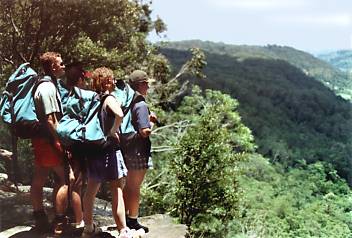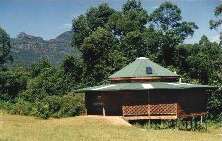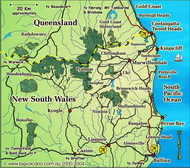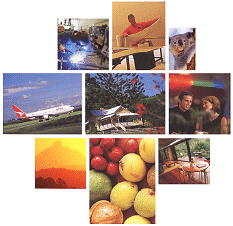Wholesome, Sustainable Outdoor Education in the Tweed
Photos © courtesy Inter-Action Pty Ltd (now Outward Bound Australia).
Adventure, fun, challenges, healthy risk taking and quiet reflection are the components that often make for a good holiday.
In the Tweed Valley in northern NSW, there are a number of businesses offering such experiences not only to those on holidays, but also to schools and tertiary students participating in core components of the education curriculum, the Outdoor Education Curriculum.
So what is Outdoor Education? The answer to such a question will never remain static or be fully answered, however there are three agreed upon core components.
1. Outdoor Pursuits

Canoeing, bushwalking, mountain biking, orienteering, high ropes courses, low ropes courses, adventure games, pioneering, abseiling, rock climbing, horse riding, and expeditioning on foot, by canoe or mountain bike or a combination of these constitute the range of Outdoor Education activities offered in the Tweed.
Others may include snow skiing, sailing, scuba diving, snorkelling or mountaineering.
Photo right: Mountain biking
Experiencing the Tweed based pursuits, often for the first time, participants gain:
- an increase in their skill level in that pursuit
- increased fitness and energy levels
- a sense of achievement, growth in self esteem and self confidence
- an enhanced, reflected upon knowledge of themselves and those with whom they live for the duration of the program (their temporary community)
- a sense of needing to take responsibility for themselves, their colleagues and the environment in which they are learning or playing.
2. Environmental Education
Google Ads
A strong component of this form of education is understanding the natural environment in which the pursuit is taking place.
If we are to encourage a stewardship role over the environment in our community, we need to help people observe the natural world, name and/or understand components of it, appreciate it and hopefully develop a desire to protect and repair it.
At a simplistic level the message is either we protect this place or it will not be there in future to create the adventure, fun, challenge and risk. At another level, we are only a component of the planet's chemical and genetic make up and it is our responsibility to care for what is a part of us.
There are obvious links then to the growing and increasingly significant curriculum area of Environmental/Sustainable Education.
3. Intra & Inter-Personal Growth.

We grow as human beings when we leave our comfort zone. If we are comfortable there is no reason to grow and move on.
Photo right: Bushwalking reward at a lookout.
Outdoor education places people in an environment that is safe yet challenging, difficult yet enjoyable. Wet, cold, tiredness, darkness, being dirty are inevitably followed by being dry, warm and clean with the sun illuminating a new, refreshing day.
This is life experienced by all the senses and the whole being, not simply a technological recreation of reality on a two dimensional screen.
In such a context responsibility needs to be taken for your own health, diet and well being, otherwise the consequences can be immediate and uncompromising.
If you forget your toilet paper eventually the laws of nature catch up with you.
In such circumstances inter-dependence among group members can become paramount to survival, especially if you were the individual that forgot the group's toilet paper!
Conflict resolution, saying how you feel and asking for what you want become the seeds of honest communication. Skilled facilitation is obviously a necessity with this form of learning.
Learning Happens by Doing

Outdoor Education is unique. It is experiential, meaning the learning happens by doing. It's sustainable, for it has the powerful potential to help groups and individuals improve physical, emotional and intellectual skills, and to grow and mature to become valuable contributing Australians in a community where responsibility is the foundation value to the Earth surviving.
Photo right: Eco-friendly amenities


